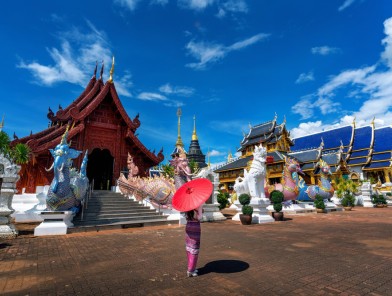It’s one of those stories that catches your attention immediately: wealthy, adventurous women from Europe, many well past retirement age, booking trips to Africa not just for the sun, but for companionship, intimacy, and experiences they might not find at home. While the headlines can make it sound scandalous or sensational, the reality is far more layered, human, and surprisingly nuanced.
The Rise of a Unique Form of Travel
Over the last decade, a quiet trend has emerged. Vacation packages to countries like Gambia, Senegal, and other West African destinations are increasingly tailored for adults seeking romantic or sexual encounters. These trips are advertised with euphemisms, marketing a sense of adventure, cultural immersion, or even wellness but underneath, there’s often an adult dimension that draws older women.
Many of these travelers are women in their 50s, 60s, or even 70s. They are financially independent, self-assured, and curious about experiences that break them away from the routine of everyday life. For some, this is less about sex and more about intimacy, attention, and connection. Yet for others, it’s explicitly about erotic encounters, often with young African men who are marketed as charming, attractive, and adventurous companions.
Who Are the “Boy Toys”?
The young men involved, sometimes referred to as “boy toys” or local escorts, are often charismatic, well-presented, and fluent in multiple languages. Many of them have backgrounds in hospitality or service industries, which makes them adept at providing not only companionship but also a polished, enjoyable experience for travelers.
For these young men, the arrangement is often mutually beneficial: the women get attention, intimacy, and a sense of empowerment; the men receive financial compensation, gifts, or opportunities to travel. It’s a transaction, yes, but it’s rarely cold or purely commercial it often includes laughter, shared experiences, and sometimes genuine affection.
The Economics Behind the Trips
These adventures are not cheap. Depending on the destination, accommodation, and duration, trips can range from a few thousand euros to tens of thousands. Packages often include luxurious hotels, guided excursions, and curated experiences with local companions.
For many older women, spending this kind of money is a form of self-investment. It’s about freedom, exploration, and reclaiming a sense of youth and vitality. There’s also a social element: many of these women travel with friends or in small groups, creating a network of like-minded adventurers who share stories, tips, and even referrals.
Beyond the Tabloid Headlines
While sensationalist media often focuses on “sex tourism” as a moral issue, the reality is more complex. Many travelers stress the consensual nature of these arrangements. There’s an understanding, however implicit, of boundaries and expectations.
It’s also important to acknowledge the cultural context. In destinations like Gambia, these encounters have created new economic opportunities. Young men gain employment, sometimes for the first time in years, and local economies benefit from increased tourism revenue. Yet, as with any industry involving intimacy and money, there are risks: exploitation, power imbalances, and legal gray areas.
The Emotional Landscape
Why do older women engage in these trips? Some seek the thrill of being desired, the novelty of a new relationship dynamic, or simply the escape from loneliness. Others are drawn to the idea of being admired in ways they might not experience at home. Many report feeling rejuvenated, confident, and more alive after their journeys.
It’s fascinating to note that these experiences are not universally sexual. Companionship, flirtation, and emotional connection are equally important. The young men often serve as attentive listeners, travel guides, or even temporary friends roles that go beyond what a traditional escort might offer.
Ethical and Practical Considerations
For anyone curious about these trips, there are a few realities to consider. First, consent is everything. Clear communication and mutual respect form the foundation of any healthy encounter. Second, safety is paramount both in terms of travel logistics and personal interactions. Third, cultural sensitivity matters. These interactions occur in a very specific social and economic context, and travelers must be aware of the implications of their choices.
Some critics argue that these arrangements perpetuate inequality or exploit vulnerability. Others point out that, when conducted ethically, they provide empowerment and opportunity for all parties involved. There’s no single answer it’s a nuanced, complex situation that requires empathy and understanding.
The Appeal of Adventure and Liberation
What makes these trips particularly compelling is the blend of adventure, liberation, and intimacy. Many women describe the experience as transformative. They return home with a renewed sense of self, stories that astonish their peers, and a deeper understanding of their own desires.
It’s a different kind of travel, one that challenges conventional ideas about age, sexuality, and connection. It’s not just about romance or sex it’s about reclaiming agency, embracing curiosity, and celebrating life on one’s own terms.
The Global Perspective
This phenomenon isn’t limited to Europe or West Africa. Variations exist worldwide older travelers seeking companionship in Asia, Latin America, or the Caribbean. But Africa, with its combination of beautiful landscapes, vibrant cultures, and economic contrasts, has become a particularly potent hub for these unique adult-oriented vacations.
It’s also a reflection of shifting demographics and societal norms. People are living longer, healthier lives, and traditional boundaries around age and sexuality are evolving. This trend is one of many that illustrates how adults are redefining freedom, pleasure, and fulfillment in the 21st century.
Wrapping Up the Story
At the end of the day, these trips are about more than just sexual encounters. They’re about connection, exploration, and choice. Older women are asserting their desires, young men are finding new opportunities, and both sides are navigating a delicate balance of economics, emotion, and ethics.
For travelers, the key is mindfulness: understanding motivations, respecting boundaries, and approaching every interaction with awareness. When done thoughtfully, these experiences can be enriching, exciting, and even transformative.
This phenomenon may raise eyebrows, but it also challenges stereotypes. Age, gender, and wealth intersect in fascinating ways, producing a landscape where desire, adventure, and human connection intertwine in unexpected, sometimes beautiful, ways.













